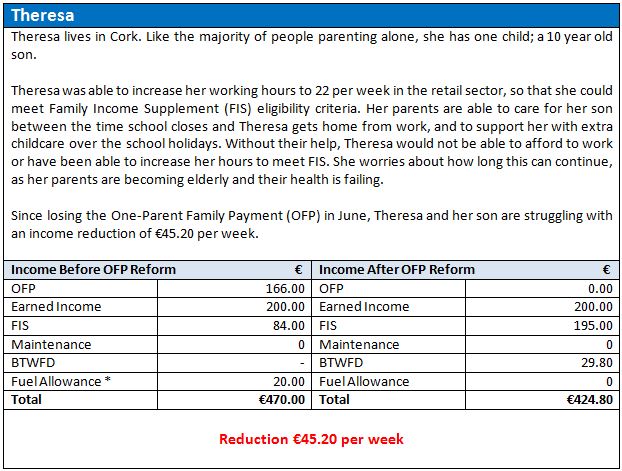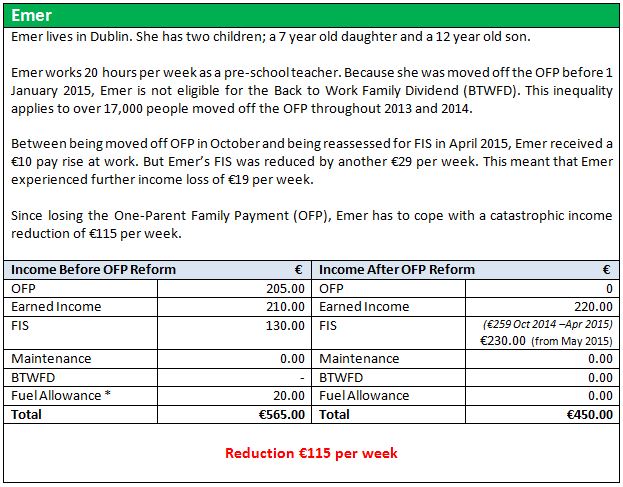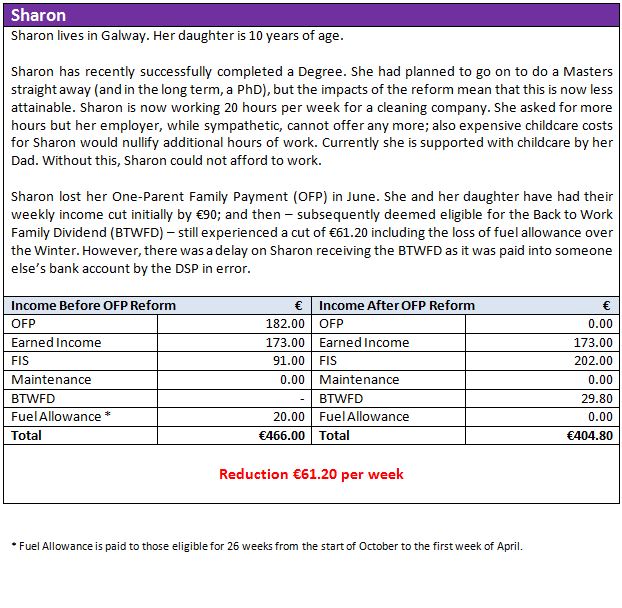 In recent months, much has been written and said about both the problems and benefits for one-parent families on social welfare that have been put through the One-Parent Family Payment (OFP) reform process. At the heart of this are the cuts in income faced by many parents who are working part-time and in receipt of social welfare.
In recent months, much has been written and said about both the problems and benefits for one-parent families on social welfare that have been put through the One-Parent Family Payment (OFP) reform process. At the heart of this are the cuts in income faced by many parents who are working part-time and in receipt of social welfare.
We asked Theresa, Emer and Sharon, each of whom is parenting alone, working part-time and has been recently transitioned from the OFP, to share the reality of their experiences of this reform process. Despite the fact that Theresa, Emer and Sharon is each doing what Government said this reform is supposed to enable – activation – all of their families have suffered a substantial financial loss. You can read what they told us below.
One Family believes that it is counter-productive to Government policy to enforce income losses on poor families when the objective of the reforms is to support people off welfare and out of poverty into sustainable employment. It is also counter-productive to imply that people parenting alone and in receipt of the OFP do not want to work. They do, and many are also in education.
These debates have not been helped by misinformation about how comparatively ‘well-off’ some families are on social welfare, or how much better off they could be in different circumstances; for example, if they were to increase their hours of part-time employment to become eligible for Family Income Supplement (FIS). One Family is responding clearly with some facts and the real-life case-studies of Theresa, Emer and Sharon in order to demonstrate the reality for the families we work with and represent.
Some facts in response to Government briefings:
- Atypical examples | It is unhelpful that atypical examples are being consistently put into the public domain, such as the example indicating that a lone parent with three children who works over 19 hours per week and qualifies for BTWFD will earn the same as a teacher. There are very few lone parents with three children (Census 2011 indicates 15.7% on all one-parent families, but this could be as low as 11% for those actually in receipt of a social welfare payment); the childcare costs associated with this atypical example are not factored in; and neither is the fact that BTWFD is only available at full rate for one year, is reduced completely after two, and is not available to those transitioned before 1 January this year. The ‘typical’ one-parent family includes one child (56.11%) or two children (28.17%).
- Other countries | Comparisons to other countries that require lone parents to be available for work when their children are younger than 7 are unhelpful and unrealistic as the structures in place in countries referenced such as New Zealand, the UK and the Netherlands are not comparable to Ireland due to the lack of available childcare here and other structural barriers. Also, there are far higher rates of investment in social services in these countries that practically enable parents to return to the work force.
- FIS | It is unhelpful to posit the gain that parents might get if they are able to increase their hours of work to over 19 whilst on the JSTA so that they become eligible for FIS, as this is extremely difficult for many to achieve. We are aware of many sectors, including government funded services, where people are unable to increase their hours. These commonly include childcare staff (particularly those providing ECCE hours); SNAs and other school staff who are frequently let go every summer; and retail staff who are subjected to zero hour contracts etc. It seems unrealistic that Government will be able to work with employers on this or that employers can be expected to always be in a position to create more hours, and it is unrealistic to expect employees to be able to demand more hours if those hours are not available.
- BTWFD | Since the reform introduction, some 17,000 lone parents have already transitioned from the OFP scheme to other income support payments in 2013 and 2014. This means that none of these parents were entitled to the Back To Work Family Dividend (BTWFD) which is supposed to support families to move from social welfare into employment.
- Childcare | The severe lack of affordable, accessible high quality childcare being uniformly available throughout Ireland remains a massive barrier. This problem for all families with children is far from being resolved; or any workable, time-lined potential solution been put forward by Government. Ireland’s childcare costs remain amongst the most expensive in the world, second only to the US. These reforms aimed to move more lone parents into the workplace are being implemented at a time when even many parents in working two-parent families feel they have no choice but for one partner to leave work owing to childcare costs being unaffordable. People parenting alone do not have a parenting partner to assist with childcare, school runs, school holidays etc. while at work and often do not have family support available.
- Income loss totals | Approximately 11,000 parents and families have lost income as a result of being transitioned to Jobseeker’s Transitional Allowance (JSTA) or Jobseeker’s Allowance (JSA) from the OFP. We do not yet know how many have or will gain financially, but we hope that this figure is high.
- Income loss amounts | The figures proposed by DSP of the losses that parents will face have been consistently under-estimated, based on testimony to One Family from many parents. We have heard of losses ranging from €30 to €140 per week. In the real-life case studies below, three parents clearly outline how they have lost from €45.20 to €115 per week.
Theresa, Emer and Sharon are all doing what Government says this reform process was implemented to support, and which should result in an increase in income: they are all working part-time over 19 hours per week and in receipt of FIS.


